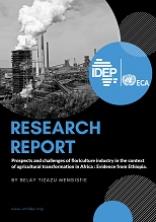IDEP Research Report - Prospects and challenges of floriculture industry in the context of agricultural transformation in Africa : Evidence from Ethiopia

The floriculture sector is booming in Ethiopia making the country the second largest exporter in Africa and the fifth largest supplier of flowers to the global market. The sector has turned in to among the five top foreign exchange earning commodities and also provides employment opportunity for hundreds of thousands of individuals. Despite the enormous economic advantages of the Ethiopian floriculture industry, environmental and social unsustainability are indeed growing. Mainstreaming social and environmental problems into economic sustainability is an emerging area of policy research and practice. This paper aims to answer whether the Ethiopian cut flower industry can be a positive example of sustainable agriculture and consistent with the inclusive growth and sustainable development agenda of Africa. Using the theoretical framework of sustainability along agricultural commodity chains, data are collected from farmers (growers), state experts, greenhouse workers, and consumers through in-depth interviews. The overall result reveals that the current production practices have failed to satisfy two of the main criteria for sustainability. The economic benefits of the flower industry come at the expense of farmworkers’ health and safety (i.e chronic and acute health problems: adverse respiratory effect, eye irritation, permanent sight reduction, skin irritation, headache) other social issues like employment insecurity, low wages, lack of promotion, and lack of awareness of rights and codes and the environment (i.e intensive use of toxic pesticide, water and poor waste management)..
Finally, this paper recommended that promoting sustainability in cut flower production requires critical consideration of agricultural technologies and identification of best practices (i.e biological control& organic farming) and strong frameworks for collaboration and mutual accountability and transparency between chain actors (the government, growers and consumers) related to safe and proper use of use of pesticide, water and social justice. It serves as a valuable resource for policy makers, farmers, investors, consumers, NGOs, experts in flower production and agribusiness and federal regulatory agencies.